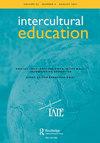当希腊人学习土耳其语:通过学习“敌人”的语言培养跨文化能力
IF 0.8
Q3 EDUCATION & EDUCATIONAL RESEARCH
引用次数: 0
摘要
学习外语不仅是一个有趣的认知过程。它也是与其他民族交流和了解他们文化的一种手段。因此,学习一门外语有助于培养跨文化交际能力,即管理新的交际条件和情况的能力。在这种情况下,希腊公民学习土耳其语可以作为一种手段,改变对土耳其人的负面刻板印象和偏见,这些偏见在很大一部分希腊人口中占主导地位。本文介绍了20名希腊成年公民在参加土耳其语课程后观念转变的定性研究结果。研究表明,大多数参与者承认土耳其语的学习和习得有助于发展跨文化交流,有助于更好地了解土耳其人民,有助于改变以前对土耳其人民和文化的负面看法。本文章由计算机程序翻译,如有差异,请以英文原文为准。
When Greeks learn Turkish: developing intercultural competence through learning the language of the ‘enemy’
ABSTRACT Learning a foreign language is not only an interesting cognitive process. It is also a means of communication with other peoples and becoming acquainted with their cultures. Therefore, learning a foreign language can contribute to the development of intercultural competence, i.e. the competence to manage new communication conditions and situations. In this context, Turkish language learning by Greek citizens may act as a means to transform negative stereotypes and prejudices against Turkish people, which predominate in a large segment of the Greek population. This article presents qualitative research findings of twenty Greek adult citizens’ transformation of perceptions, subsequent to their attending Turkish language courses. The research established that the majority of the participants acknowledged Turkish language learning and acquisition as a contribution to the development of intercultural communication, to a better acquaintance with Turkish people and the transformation of former negative perceptions of Turkish people and culture.
求助全文
通过发布文献求助,成功后即可免费获取论文全文。
去求助
来源期刊

Intercultural Education
EDUCATION & EDUCATIONAL RESEARCH-
CiteScore
2.30
自引率
8.30%
发文量
36
期刊介绍:
Intercultural Education is a global forum for the analysis of issues dealing with education in plural societies. It provides educational professionals with the knowledge and information that can assist them in contributing to the critical analysis and the implementation of intercultural education. Topics covered include: terminological issues, education and multicultural society today, intercultural communication, human rights and anti-racist education, pluralism and diversity in a democratic frame work, pluralism in post-communist and in post-colonial countries, migration and indigenous minority issues, refugee issues, language policy issues, curriculum and classroom organisation, and school development.
 求助内容:
求助内容: 应助结果提醒方式:
应助结果提醒方式:


